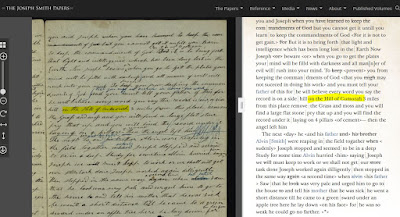In a comment on the Mark Hoffman Netflix series, Patrick Mason wrote this great insight:
The evilest thing Hofmann did was to kill two innocent people in cold blood. But perhaps the second most sinister thing he accomplished was to undermine our collective confidence in facts. Hofmann was a master forger, yes, but even more deeply he was a master manipulator of one of the pillars of social trust — the ability to agree on what the facts are. When that pillar begins to crumble, it’s not just the Saints and the nerds who have reason to worry.
That concept of "social trust" expresses my disagreement with the way the current correlated history has been edited to accommodate M2C.
For example, the Saints book quotes Lucy Mack Smith's history 127 times. That's a legitimate and emphatic endorsement of her credibility and reliability, as well as her unique relationship with Joseph Smith and the insights that ensued.
But Saints omitted every reference to Cumorah, even though Lucy's account of what Joseph told her Moroni told him includes some important details available nowhere else.
As Patrick Mason pointed out, everyone interested in Church history should at least agree on what the facts are.
But Church members can't agree on the facts when they don't even know the facts.
_____
Here are two examples of what I'm referring to.
A common theme among LDS scholars lately is that Joseph never identified the hill as Cumorah, or at least not until he wrote the letter that became D&C 128:20, by which time, according to the scholars, Joseph had adopted the false tradition that Cumorah was in New York. This false tradition, supposedly, was created by unknown persons in the early days of the Church.
Yet we have David Whitmer claiming repeatedly that he first heard about Cumorah directly from the divine messenger who had the abridged plates. This was in June 1829 before he had ever read a word in the Book of Mormon. We have Parley P. Pratt saying in 1831 that Moroni called the hill Cumorah anciently. We have Martin Harris referring to the hill as Cumorah in 1829.
What explains these accounts?
It's actually very simple and clear.
Lucy explained that Moroni identified the hill as Cumorah during his first visit to Joseph Smith.
Now Joseph beware or when you go to get the plates your mind will be filled with darkness and all manner of evil will rush into your mind. To prevent you from keeping the commandments of God that you may not succeed in doing his work…
the record is on a side hill on the Hill of Cumorah 3 miles from this place remove the Grass and moss and you will find a large flat stone pry that up and you will find the record under it laying on 4 pillars of cement— then the angel left him.
|
Saints, Vol. 1, p. 36 |
Lucy History 1844-5 |
Lucy History 1845 |
|
The Smiths
liked having Joseph and Emma with them. But their son’s divine call made them
anxious. People in the
area had heard about the gold plates and sometimes
went looking for them.18 One day,
Joseph went to town on an errand. Expecting him
back for dinner, his parents were alarmed when he did not return. They waited for hours, unable to sleep. At last Joseph opened the door and threw himself into a chair, exhausted. “Why are you
so late?” his father asked. “I have had
the severest chastisement that I ever had in my life,” Joseph said. “Who has been
taking you to task?” demanded his father.
“It was the angel of the Lord,” Joseph replied. “He says I have been negligent.” The day of his next meeting with Moroni was coming soon. “I must be up and doing,” he said. “I must set myself about the things which God has commanded me to do.”19 |
<Soon
after> this Mr. Smith had occasion to send Joseph to Manchester on
buisness he set out in good season And we expected him <to be> at
home as soon as 6 oclock but he did not arrive…. he did not
return home till the night was considerably advanced his Father and myself
were together I no one else was present when he
entered the house he seemed threw himself into a chair seemingly much
exhausted he was <as> pale as ashes his Father exclaimed Joseph why have <you> staid so late has anything happened you we have been in distress about you these 3 hours
|
Not long
after this his father had occasion to send him to Manchester on business.
<And,> as he started quite early in the morning, we expected him
home, at the outside, by 6. o clock in the evening. But when 6. came he did
not arrive.— we always had a peculiar anxiety about him whenever he was
absent from us; for, it seemed as if something was always taking place to
jeopardize his life. But to return, he did not get home till the night was
far spent. My husband
did not observe his appearance, and immediately exclaimed, “Joseph, why have
you staid so late? has anything happened you? we have been much distressed
about you these three hours. Presently he smiled, and said in a very calm tone, “I have taken the severest chastisement, that I have ever had in my life”. that the time had come for the record to <be> brought forth; and, that I must be up and doing, and set myself about the things which God had commanded me to do: but, Father,’ continued he, ‘give yourself no uneasiness concerning the reprimand that I have received; for I now know the course that I am to pursue; so all will be well.” |








No comments:
Post a Comment